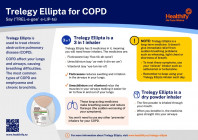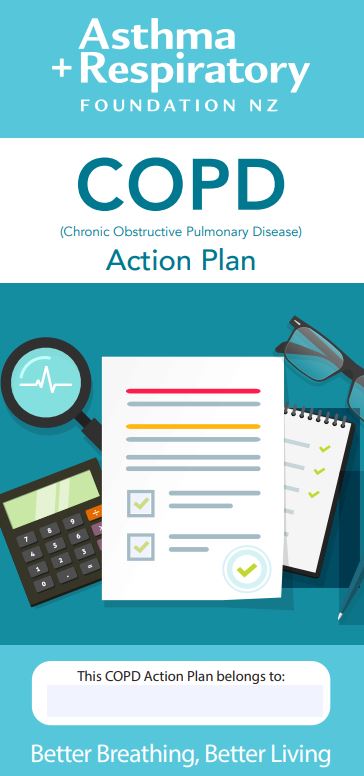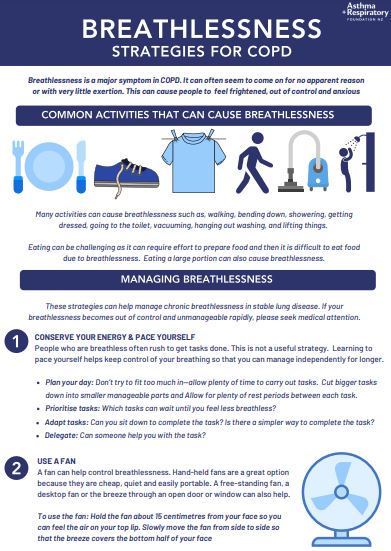Trelegy Ellipta
Key points about Trelegy Ellipta
- Trelegy Ellipta is used to treat COPD or asthma.
- Trelegy Ellipta contains 3 medicines (fluticasone, umeclidinium and vilanterol) in a single inhaler.
- Find out how to use Trelegy Ellipta correctly and possible side effects.

Trelegy Ellipta® is used to treat moderate to severe chronic obstructive pulmonary disease (COPD) or asthma. COPD is a group of diseases that affect your lungs and airways, causing breathing difficulties. The 2 main types of COPD are emphysema and chronic bronchitis. Learn more about COPD and medicines for COPD.
Trelegy Ellipta contains 3 medicines (fluticasone, umeclidinium and vilanterol) mixed in 1 inhaler
The benefit of having 3 medicines in a single inhaler means you only need to use 1 inhaler instead of 2 or 3. You won't need to use other 'preventer' inhalers for your COPD.
- Fluticasone reduces swelling and irritation in the airways in the lungs. It belongs to a group of medicines known as inhaled corticosteroids.
- Umeclidinium and vilanterol work together to relax the muscles in your airways. This helps to open your airways and makes it easier for airflow in and out of your lungs.
Trelegy Ellipta is a dry powder inhaler. The powder is breathed in through your mouth using the inhaler device, so the medicine can go straight into your airways and lungs and very little of the medicine gets to the rest of your body.
Funding in Aotearoa New Zealand
- Trelegy Ellipta is funded for people with moderate to severe COPD who are using 2 or 3 inhalers daily and meet other criteria. Talk to your healthcare provider to see if Trelegy Ellipta is suitable for you.
- Note: Trelegy Ellipta inhaler comes in 2 strengths but only the lower strength is funded. This is fluticasone furoate 100 mcg with umeclidinium 62.5 mcg and vilanterol 25 mcg which is the strength used for COPD.
- To treat these symptoms, use your ‘reliever’ medicine, eg, salbutamol(external link) (Respigen®, SalAir®, Ventolin®) or terbutaline(external link) (Bricanyl® Turbuhaler®).
- Remember to continue using your Trelegy Ellipta inhaler each day.
- To work well, Trelegy Ellipta must be used once daily, every day.
Factsheet: Trelegy Ellipta for COPD

Trelegy Ellipta for COPD
Healthify He Puna Waiora, NZ, 2024
English [PDF, 430 KB]
te reo Māori [PDF, 600 KB]
Samoan [PDF, 526 KB]
Tongan [PDF, 801 KB]
- Follow your healthcare provider's instructions carefully. The pharmacy label on your medicine will tell you how much to use, how often to use it and any special instructions.
- The dose of Trelegy Ellipta is 1 inhalation once daily.
- Use your inhaler at the same time each day, either in the morning or evening. This will give the right space between doses and help you to remember to use it.
- If you miss a dose, you can take it as soon as you remember. But if it's nearly time for your next dose, just take your next dose at the right time. Don't take an extra dose to make up for a missed dose.
- Since COPD is a long-term condition, the use of Trelegy Ellipta is ongoing and it needs to be used every day. Keep using your inhaler every day. Don't stop using it, even if you feel better.
To get the most benefit from your inhaler, it's important to use the correct technique. Ask your healthcare provider to show you how to use an Ellipta® inhaler.
The video below shows you how to use an Ellipta inhaler. 'Ellipta' is the name for the type of inhaler device, there are different names for each Ellipta depending on the medicines inside the inhaler.
- It's important to know the name and colour of your Ellipta, eg, Anoro®, Breo®, Incruse® or Trelegy®.
- Your Ellipta may be a different colour to the one in the video below. Read more about understanding your medicines.
NOTE: Trelegy Ellipta comes in a foil package. Once you have opened the package, the inhaler should be used within 1 month (30 days). Write down the date you open it, so you know when it expires.
Video: How to use an Ellipta inhaler
Using an Ellipta inhaler
- Remove: Take the inhaler from the foil packing.
- Open: Pull back the mouth piece cover until you hear a click. Hold the inhaler upright at all times. Breath out away from the inhaler.
- Inhale your dose: Press your lips around the mouthpiece without covering the air vents on either side. Begin to breathe in quickly and deeply through your mouth. Hold your breath for up to 10 seconds. Breathe out slowly. Close the mouth piece cover.
Cleaning and storing an Ellipta inhaler
Clean your inhaler once a week by wiping the mouthpiece with a clean dry tissue. Do not wash the mouthpiece or allow it to get wet when cleaning. Close the inhaler when not in use. Store it in a cool dry place, away from heat and moisture.
When to start a new Ellipta
There's a window on the front of the Ellipta® inhaler called a dose counter. When it turns red it's time to get a new inhaler.
Here are some things to know when you're using a Trelegy Ellipta inhaler. Other things may be important as well, so ask your healthcare provider what you should know about.
- Rinse your mouth with water after using Trelegy Ellipta: Trelegy Ellipta contains fluticasone, which can cause sore throat, hoarse voice and thrush in your mouth. Some of the medicine may stay behind in your mouth after each dose, so after each use, rinse your mouth with water and spit it out, so no medicine stays in your mouth. This reduces the chance of side effects.
- Trelegy Ellipta is a dry powder that contains lactose: It's safe to use Trelegy Ellipta if you're lactose intolerant. However, if you have been diagnosed with a milk protein allergy (hypersensitivity) you should talk to your healthcare provider before you use Trelegy Ellipta.
- Keep track of your doses so you don't run out: This is so you can refill your prescription before you run out. Trelegy Ellipta has a dose counter so you know exactly how many doses are left in the inhaler. Your inhaler has 30 doses. The dose counter counts down by 1 each time you open the cover. If you open and close the cover of the Trelegy Ellipta inhaler without inhaling the medicine, you will lose that dose. When less than 10 doses are left, the counter shows red, so you have time to contact your doctor for a new inhaler. When it shows ‘0’ it will be empty.
- Expiry date: Trelegy Ellipta comes in a foil package. Once you have opened the package, the inhaler should be used within one month. Write down the date you open it so you know.
- Taking other medicines: Trelegy Ellipta may interact with some medicines, herbal supplements and rongoā Māori, so check with your doctor or pharmacist before starting Trelegy Ellipta and before starting any new products.
- Pregnancy: Trelegy Ellipta isn't usually recommended for use during pregnancy. Talk to your doctor if you are pregnant, if you think you may be pregnant or if you're planning to have a baby,
- Check your inhaler technique regularly: It's also important to know how to use your inhalers correctly, otherwise you may not be getting enough medication into your lungs. Ask your healthcare provider to watch you use your inhaler so you can be sure you're doing it properly.
- If your inhaler doesn't seem to be working as well, check with your healthcare team. Some people with COPD may not have enough strength to breathe in to use an Ellipta inhaler. Your healthcare team may be able to check this by measuring your inspiratory flow rate in the clinic or hospital.
Like all medicines Trelegy Ellipta can cause side effects, although not everyone gets them. Often side effects improve as your body adjusts to the new medicine.
| Side effects | What should I do? |
|---|---|
|
|
|
|
|
|
|
|
|
|
|
|
Read more about medicines and side effects and reporting a reaction you think might be a side effect.
Trelegy Ellipta(external link) Medsafe Consumer Information
Trelegy Ellipta for COPD [PDF, 430 KB] Healthify He Puna Waiora, NZ, 2024
COPD action plan(external link) Asthma and Respiratory Foundation, NZ English(external link), te reo Māori(external link), Samoan(external link), Chinese (simplified)(external link)
Breathlessness strategies for COPD(external link) Asthma + Respiratory Foundation, NZ, 2021
References
- Trelegy Ellipta(external link) Medsafe Datasheet, NZ

COPD action plan
Asthma and Respiratory Foundation, NZ
English, te reo Māori, Samoan, Chinese (simplified)

Breathlessness strategies for COPD
Asthma + Respiratory Foundation, NZ, 2021
Credits: Healthify editorial team. Healthify is brought to you by Health Navigator Charitable Trust.
Reviewed by: Dr Noni Richards, PhD, BPharm; Esther Kostan, Respiratory Specialist Clinical Pharmacist, Counties Manukau; Angela Lambie, Pharmacist, Auckland; Sarah Mooney, Allied Health Advanced Practitioner (Cardio-Respiratory Physiotherapy), Counties Manukau
Last reviewed:
Page last updated:





